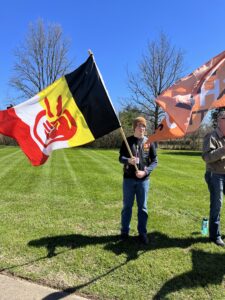Author Eliana Ramage was born and raised in Nashville. Her new release, “To the Moon and Back,” tells the fictional story of one young woman’s quest to become the first Cherokee astronaut.
Cherokee cyclists retrace the Trail of Tears to remember — and reclaim — their history
For the last four decades, a group of bicyclists has embarked on a 950-mile bike ride following the Trail of Tears in honor of Cherokee ancestors who were forcibly removed from their homelands.
NashVillager Podcast: Remembering the Trail of Tears
Why is there so little to remind us of the way Native nations were displaced via Tennessee routes? Plus, the local news for May 28, 2025.
NashVillager Podcast: Cherokee recognition in Tennessee
How should we acknowledge that this land belonged to the Cherokee first? Plus your local newscast for May 23, 2024.
At Hermitage birthday event, Indigenous protestors ask if Andrew Jackson’s legacy is worth celebrating
Wednesday marked the 256th birthday of Andrew Jackson, one of three presidents to hail from Tennessee. At a celebration at the Hermitage, local Indigenous activists protested the controversial figure.
Native Americans were forced to travel through Nashville on the Trail of Tears. A remnant of the bridge they crossed remains downtown.
Nearly 200 years ago, a thousand Cherokee people crossed the Cumberland River in Nashville on their way to modern-day Oklahoma. Now, very little remains of this portion of the Trail of Tears.
The legacy of the Trail of Tears in Nashville and Middle Tennessee
Starting in October 1838, more than 16,000 Cherokee people who had been forced from their homes in Alabama, Georgia, North Carolina and Tennessee began their journey to Indian Territory, in what is now known as Oklahoma.
Centuries after the Trail of Tears, Tennesseans honor the legacy of tribal members
Tribal members were forced to leave their homelands — including Tennessee — and relocate west of the Mississippi River.







